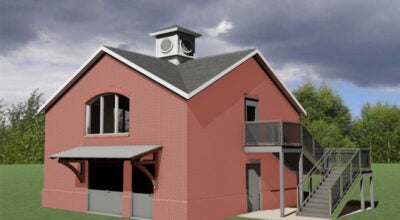Town may lease Wombwell House
Published 7:08 pm Tuesday, February 9, 2021
Smithfield may lease the Wombwell House to the Isle of Wight County Historical Society for 20 years.
But town council decided some details need to be worked out before the agreement moves forward.
Councilmember Valerie Butler said after the council’s Feb. 2 meeting that the town’s Public Buildings and Welfare Committee will work out the details with the historical society and bring the matter back to council for their consideration in March.
The foundation of the proposed agreement is that in exchange for a $1 a year lease, the historical society will repair, preserve and update the house, which was built before the Civil War, and today stands near the Luter Sports Complex, for use as a headquarters for the organization.
However after reviewing the initial agreement, “I just don’t feel the lease is specific enough yet for us to be able to vote on it,” said Councilmember Rady Pack. He expressed concern about several issues, one of which is that he felt the timeline of proposed updates to the property should be written into the agreement.
“We do have a list from the tenant with four years’ worth of construction projects on it. And that’s fantastic and I think it’s a wonderful guideline to use, but we don’t reference it in the lease. What happens if they don’t meet these guidelines, where are we? The last thing we want to do is get five years down the road from now and the building looks exactly how it is today.”
Pack said it’s clear that’s not what anybody wants but added there should be something in writing to provide the town some recourse if things don’t go as planned. He also suggested that the terms include that the society show proof of cash to carry out the work.
The agreement also said Smithfield would extend water and sewer to the house at the town’s expense and provide ongoing general landscaping services. With a $1 a year lease, “I’m not sure why we would want to fund the water and sewer connections to this building and along those same lines, we have said we will mow the grass on the premises and provide general landscaping at the town’s expense.”
Both of those issues, he said are “worthy of discussion from our point,” Pack said.
The Isle of Wight County Historical Society said it has $50,000 available to start work on the house, according to a committee report. In the first two years, the organization’s proposed work on the house is slated to include repairs to the roof, chimney and foundation brickwork, removing vinyl siding and 1950s-era window awnings, upgrading the electrical and plumbing systems and locating a family cemetery that may be on the property.
Future work will include restoring the wood floors, insulating the attic and adding a modern HVAC system. The initial agreement also says the society may only use the house as administrative offices, for meetings, fundraising, fellowship events and for providing the public with a place to access the organization’s historical materials.
This summer, the town and historical society agreed to take several months for a feasibility study to determine how exactly the building needs to be repaired in order to preserve it. Before then, the house’s fate had been uncertain for several years, The Smithfield Times previously reported.
In 2016, the town put the house on the market for $1 to anyone willing to relocate it at their own expense. When that didn’t work, town council voted in early 2018 to let the volunteer fire department burn it down for a training exercise.
But six months later, council voted to delay the demolition until 2019, when Preserve Smithfield, a local organization working to save the town’s historic buildings, expressed an interest in the property. In January 2019, when the topic came up again, the historical society approached the town about the possibility of restoring the house at its current location and making it into the organization’s headquarters.
Historic value
Built by Dr. Jordan Wombwell, the residence may have had a role in Civil War-era activities that happened in and around Smithfield, according to Marc Wagner, a senior architectural historian with the Virginia Department of Historic Resources in Richmond.
In a 2018 letter to the town, Wagner said the department “strongly endorses the preservation of Wombwell House.” The Greek Revival Style farmhouse, which likely dates to the 1840s, “is a complement to the Town’s more urban architecture,” Wagner wrote. The house would have been at the edge of the town’s core area when it was built.
After years of neglect and organized efforts to save it failed, demolition of the Pierceville house, a structure from the 1730s on Grace Street that likely dated to the earliest years of the town’s establishment, was recently completed. The house and vintage outbuildings had become extremely dilapidated.
A long-vacant grocery store building adjacent to Pierceville was also recently torn down. Former Smithfield Foods chairman Joseph W. Luter III and business partners say they’d like to redevelop the property with single and multi-family homes, offices, assisted living residences, a hotel and possibly a walking trail.
“We should not take these pre-1860 buildings for granted,” Wagner said. “The stock of these houses continues to diminish statewide and as they disappear, we lose our touchstone with that era.”





